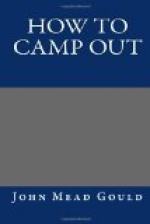You may like to know that this is almost an exact history, at least as far as eating is concerned, of a twelve days’ tramp I once went on in company with two other boys. There was about five dollars in the party, and nearly two dollars of this was spent in paying toll on a boat that we took through a canal a part of the way. We carried coffee, sugar, pork, and beef from home, and ate potatoes three times a day. We had a delightful time, and came home fattened up somewhat; but I will admit that I did not call for potatoes when I got back to my father’s table, for some days.
In general, however, it will be noticed that those who camp out for the season, or go on walking-tours, do so at a moderate expense because they start with the determination to make it cheap. For this purpose they content themselves with old clothes, which they fit over or repair, take cooking-utensils from their own kitchen, and, excepting in the matter of canned foods, do not live very differently from what they do at home.
Nearly all the parties of boys that I have questioned spend all the money they have, be it little or much. Generally those I have met walking or camping seem to be impressed with the magnitude of their operations, and to be carrying constantly with them the determination to spend their funds sparingly enough to reach home without begging. It is not bad practice for a young man.
Here I wish to say a word to parents—having been a boy myself, and being now a father. Let your boys go when summer comes; put them to their wits; do not let them be extravagant, nor have money to pay other men for working for them. It is far better for them to move about than to remain in one place all the time. The last, especially if the camp is near some place of public resort, tends to encourage idleness and dissipation.
When you return home again from a tour of camping, and go back to a sedentary life, remember that you do not need to eat all that your appetite calls for. You may make yourself sick if you go on eating such meals as you have been digesting in camp. You are apt also upon your return to feel as you did on the first and second days of your tour; this is especially liable to be the case if you have overworked yourself, or have not had enough sleep.




